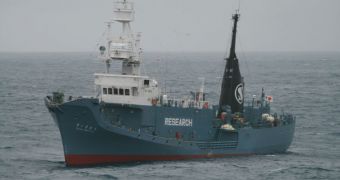The whaling fleet Japan sends out every year to carry out “scientific research” in the South Pacific Ocean was supposed to begin its illegal operations for 2012 in waters southwest of Australia. The plan failed when the three ships operated by the Sea Shepherd Conservation Society discovered the fleet.
Originally, the ships were first encountered at a location about 500 miles (804 kilometers) west of Fremantle, Australia, where they were preparing to start whaling. The arrival of the SSCS vessels prevented them from doing so, and the vessels scattered.
As the Sea Shepherd ships the Bob Barker and the Steve Irwin were chasing a harpoon vessel and the Japanese factory ship, two other harpoon vessels were chasing the SSCS ships. This allowed the Japanese crews to alert their colleagues on the factory ship, so that they could avoid confrontations.
Over the past month, the whaling fleet traveled more than 4,500 nautical miles (8,334 kilometers) eastwards. All Japanese and Sea Shepherd vessels are now in the Ross Sea, between Victoria Land and Marie Byrd Land, Antarctica.
“You can say we chased the whale killers into yesterday since we have crossed the International Date Line,” explains Sea Shepherd and Steve Irwin Captain Paul Watson.
“This illustrates that they really have no scientific agenda at all since their so-called survey requires them to “sample” whales from the two different areas alternatively each year. This is not about science and it never has been,” he adds.
Watson explains that the Japanese have absolutely no reason to be out in the Southern Ocean Whale Sanctuary, an economic-free zone. The Institute for Cetacean Research (ICR), the name of the bogus institution that manages Japan's fictitious whale research program, does not even make a profit.
“It’s not even about profit anymore because we have negated their profits. It’s simply about pride. Whaling in the Southern Ocean has become a heavily subsidized welfare project for an archaic industry that has no place in the twenty-first century,” Watson says.
In addition, the money the ICR paid this year for adding extra security to its fleet, roughly $30 million, were taken out of the relief fund meant to alleviate the pain and suffering of people affected by the March 11, 2011 earthquake and tsunami that hit Japan.
Last year, SSCS's constant pursuit of the whalers ensured that the fleet returned home in shame, bringing back just 17 percent of its kill quota. This year, that percentage is bound to be even smaller.
Japan, Iceland and Norway are the only countries in the world that defy – under various pretexts – a 1986 UN moratorium banning all commercial whaling.

 14 DAY TRIAL //
14 DAY TRIAL //